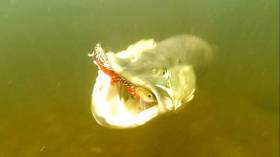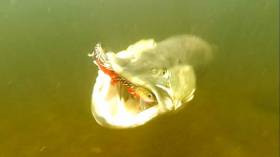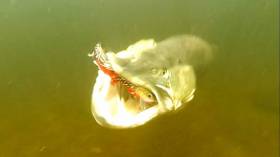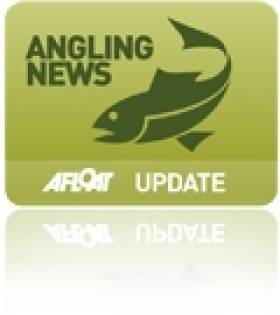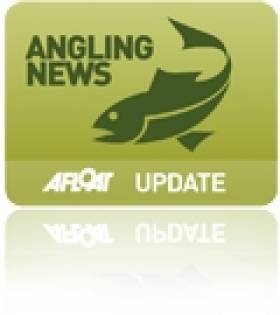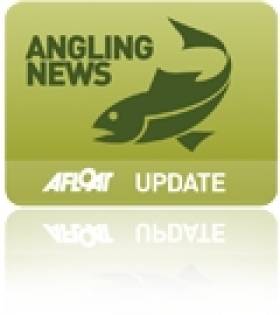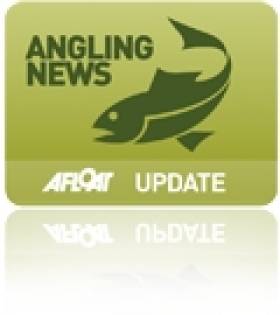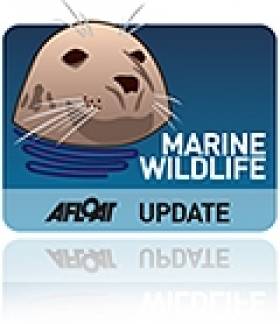Displaying items by tag: Pike
Connacht Anglers Fear Threat To Wild Brown Trout By ‘Predator’ Pike
#Angling - Wild brown trout in Connacht lakes face extinction due to unchecked numbers of pike, local anglers fear.
According to Galway Bay FM, the Connacht Angling Council says stocks in Lough Corrib and Lough Mask are among those under threat unless measures such as a closed season for angling and a pike cull are introduced.
Ahead of its ‘Pike are Predators – Save our Wild Brown Trout’ campaign launch this Wednesday 20 September from 8pm at the Boat Inn in Oughterard, the council has launched an online petition in the hopes of persuading Inland Fisheries Ireland to take action against the “predator” species.
Public Consultation On Pike Management In Wild Brown Trout Fisheries
#Angling - Inland Fisheries Ireland has launched a public consultation on the management of pike in designated wild brown trout fisheries.
It follows the IFI board’s decision to commence a review period of its policies on the management of wild brown trout, pike and bass that were initially developed in 2014.
IFI says it welcomes the opportunity to engage with stakeholders and their “diverse opinions” on the issue via their submissions, which will be reviewed and considered by the newly appointed Pike and Wild Brown Trout Policy Review Group that comprises a range of representatives from all disciplines within the fisheries agency.
“Over two years ago, we developed policies which have an impact on how we manage the pike species in fisheries which are predominately home to wild brown trout,” said IFI chief executive Dr Ciaran Byrne. “This review and public consultation period allows us to reflect on those policies and to hear from our stakeholders on their views on this issue.
“We know there are varied opinions out there and this is the chance for the public to have their say. This public consultation will help inform our future policies and work in this area.”
Information on the consultation is available from the IFI website or from any IFI office. The public consultation period will run for four weeks until 5pm on Thursday 1 December.
All submissions must be made in writing and will be published on the website. Submissions should be marked ‘Public Consultation – Pike Management in Brown Trout Fisheries’ and can be submitted by email to [email protected] or by post to:
Policy Review
Inland Fisheries Ireland
Sunnyside House
Macroom, Co Cork
Review Of National Pike & Trout Policies
#Angling - Inland Fisheries Ireland (IFI) has today (Monday 4 July) published the indicative timetable for the review of the National Pike and Trout Policies.
Following the appointment of a Policy Review Group later this month, the review process will commence with a scoping consultation which will be open to all interested parties.
IFI says it has long recognised that public policy-making can be enhanced through the active involvement and contribution of all stakeholders and has set out how it will develop policies and consult with stakeholders in its IFI Procedure on Policy Development and IFI Stakeholder Consultation Policy.
It is expected that the updated National Pike and Trout Policy documents will be available a year from now in July 2017.
A policy group will be appointed shortly and will comprise of five IFI staff from the research, operations and business Development divisions.
“IFI is committed to consulting with stakeholders and the general public on matters of inland fisheries policy," said chief executive Dr Ciaran Byrne. "I expect the forthcoming scoping consultation process to gather useful information that will provide an evidence base for the update of the pike and trout policies in tandem.
“An agreed view from angler stakeholder groups would be most welcome and I urge the representative groups to work for such an outcome. I encourage all domestic and tourist anglers, tourism providers and the general public to provide their views on the important issues regarding the management of our important pike and trout species.”
The inland fisheries body acknowledges the upcoming protest being staged by pike interests and can confirm that no decision has been taken regarding the cessation or otherwise of pike management operations in designated trout waters for 2017.
IFI says it has accelerated the review of the policies and is working to ensure the completion of this exercise in as consultative way as possible that ensures all interested parties have input to policy formulation .
As advised previously, work continues within IFI regarding the examination of:
- The current stock management programme, including resource usage, fish transfer and health and safety.
- Marketing and socio-economic information to include actual and potential economic value.
- Scientific information to provide advice and to consider the scientific merits of the processes being currently undertaken.
The timeline for the review process is available to read or download HERE.
Ireland's Bass, Pike & Trout Policies Set For Review
#Angling - Inland Fisheries Ireland (IFI) has confirmed that it is in the process of reviewing the national policies for the management of bass, pike and trout.
The policies were launched by IFI in August 2014 and have a three-year review cycle.
IFI has commenced the process of examining all relevant and appropriate data to inform the review of these policies. This process was initiated in January 2016 and includes the examination of:
- The current stock management programme, including resource usage, fish transfer and health and safety.
- Marketing and socio-economic information to include actual and potential economic value.
- Scientific information to provide advice and to consider the scientific merits of the processes being currently undertaken.
An important element of each review will be a public consultation process which will be announced later in 2016. The consultations will ensure that anglers and other stakeholders have sufficient time to consider the existing policies and make submissions that will inform their review.
IFI chief executive Dr Ciaran Byrne said: “The public consultation element of the reviews presents an excellent opportunity for the 273,600-strong community of Irish anglers to engage with IFI and will ensure that the decision-making process becomes better informed, more rigorous and more accountable.
"IFI is committed to on-going engagement with anglers and other stakeholders through public meetings, the National Inland Fisheries Forum, public consultations and our complaints, comments and compliment procedures.”
During an anglers’ demonstration at IFI headquarters in Citywest on 24 March, IFI received a petition signed by over 22,000 people from around the world, including a total of 1,032 Irish signatures.
A group of approximately 80 anglers protested against the implementation of the current Pike Policy, agreed with the Irish Federation of Pike Angling Clubs and the National Association of Recreational Anglers in 2014.
Commenting on this, Dr Ciaran Byrne added: “While the petition represents a small proportion of Irish anglers, IFI recognises the unified views of those who signed it and we have made contact with the protest organisers with a view to engaging with this diverse group of anglers. IFI appreciates that public policy-making can be enhanced through the active involvement and contribution of all stakeholders with an interest in particular policy developments.
“In recent weeks, many of the protesters have made their views known to IFI through our comments and complaints channels but IFI wishes to assure all anglers that they will have the opportunity to make a representation in the public consultation process on the Pike, Trout and Bass Policy reviews later this year.
"Furthermore, IFI is running a number of surveys in conjunction with the ESRI to ensure that we capture the views of our domestic anglers as comprehensively as possible.”
Five Men Convicted for Fishing Offences in County Monaghan
At a sitting of Castleblaney District Court on 10th February 2016, Judge Denis McLoughlin convicted five men for coarse and pike fishing offences at lakes in Castleblaney, Co. Monaghan. Fines issued totalled €1,250 and costs were awarded to Inland Fisheries Ireland to the amount of €5,320.
Mr. Rimantus Janusonis was fishing at Lough Muckno in Castleblaney, Co. Monaghan, on 1st May 2015. He was found to be fishing with three rods, exceeding the legal limit which stipulates that a person may not fish with more than two rods at a time, and was apprehended by Inland Fisheries Ireland Officer Ronan O’Brien. Mr. Artur Moisjenkov was fishing at Drumgristin Lake in Co. Monaghan on 14th June 2015 and was acting suspiciously. Officer Ronan O’Brien found six coarse fish in Mr. Moisjenkov’s possession, one of them measuring 30 centimetres in length.
On 4th July 2015, at Drumillard Lake, Co. Monaghan, Mr. Gazda Henryk and Mr. Jan Pieczykolan were found to have pike and bream over the legal size limits in their possession by two private waterkeepers from Castleblaney Anglers Club. Mr. Henryk and Mr. Pieczykolan were subsequently apprehended by Inland Fisheries Ireland Officer Dermot Wynne for having fish over the legal size limit.
On 25th July 2015, an individual was detected by private waterkeepers at Concra Wood in Lough Muckno, Co. Monaghan. Mr. Andrei Ion Ursache was found to have 22 perch in his possession with three over the size limit of 25 centimetres. He was apprehended by Inland Fisheries Ireland Officer Seamus Kelledy for exceeding the limit of four coarse fish in his possession.
None of the defendants were present at a sitting of Castleblaney District Court on 10th February 2016. The cases had been adjourned a number of times, following the reissuing of summons. Judge McLoughlin convicted the individuals as follows:
· Mr. Rimantus Janusonis, Drogheda, Co. Louth, for breach of Byelaw no. 595 of 1977, which states that a person may fish with not more than two rods at any time.
· Mr. Gazda Henryk, Dundalk, Co. Louth, was convicted for breach of the pike Byelaw no. 809 of 2006, which states that it is prohibited to kill any pike greater than 50 centimetres in length.
· Mr. Andrei Ion Ursache, Drogheda, Co. Louth; Mr. Artur Moisjenkov, Drogheda, Co. Louth; and Mr. Jan Pieczykolan, Dundalk, Co. Louth were convicted for breaches of the coarse fish Byelaw no. 806 of 2006, for taking and killing more than four coarse fish per day.
Judge McLoughlin fined each defendant €250 and ordered the payment of €1,064 each of total costs to Inland Fisheries Ireland to be paid within four months.
Mr. Brian Beckett, Director of Inland Fisheries Ireland Dublin, said: “I would like express IFI’s appreciation for the assistance of two waterkeepers Mr. Patrick McArdle and Mr. Micky O’Connor, who detected and followed up on some of these incidents with IFI staff in the Dundalk District. This serves as a great example of the vigilance, commitment and team work in operation between Inland Fisheries Ireland and private waterkeepers in protecting and conserving our valuable fisheries resource.”
Dr Ciaran Byrne, CEO of Inland Fisheries Ireland, noted: “Lough Muckno, Drumgristin and Drumillard Lake, along with many others, make Castleblaney in Co. Monaghan the jewel in the crown for pike and coarse fishing in Ireland’s North East. They provide an important recreational amenity to both local and overseas anglers as well as important match fishing venues.
“Angling generates over €830 million to the Irish economy every year and illegal activity and environmental crime jeopardises the potential of our wonderful natural resource to sustain stocks and the social and economic benefits derived from them.”
Inland Fisheries Ireland (IFI) has a confidential hotline number to enable members of the general public to report incidents - 1890 34 74 24 or 1890 FISH 24. This phone line is designed to encourage the reporting of incidents of illegal fishing, water pollution and invasive species.
IFI Reviews Pike Management In Wild Trout Fisheries
#Angling - Inland Fisheries Ireland (IFI) says it has "temporarily suspended" pike management operations in designated wild brown trout fisheries.
The agency added that it is "currently undertaking a review of the necessary standard operating procedures for these operations and will resume stock management as these are completed."
This review, according to IFI, will focus first on boat electrofishing (using electricity to stun fish in the water before catching) before other stock management methods.
New Irish Pike Research Published
#Angling - Inland Fisheries Ireland (IFI) has just published three research reports on pike in Irish waters.
The Diet of Pike in Irish Watercourses aims to elucidate the variation in the diet of Irish pike between river, lake and canal habitats, and to quantify niche size and dietary specialisation and attempt to identify the timing of the switch to a piscivorous diet.
Ecomorphology of Pike in Irish Freshwaters deals with the morphology and condition of pike in Ireland.
Genetic Structure of Pike and their History in Ireland (which is available to download from the IFI website HERE) investigates the genetic variation of Irish pike populations and their relationship with European groups, in an attempt to identify where they came from, as it is largely assumed to have been introduced by humans over the past few hundred years.
The research was carried out as part of a wider PhD research project conceived by IFI and University College Dublin, with the overall aim of updating and informing managers as to the biology and ecology of pike (Esox lucius L.) in Ireland, a historically understudied species in the Irish context.
The field work and sampling for this project was carried out opportunistically in collaboration with IFI, and through attendance at many pike angling competitions.
The authors of these papers also thank the many pike anglers that contributed to the study and allowed D Pedreschi to sample their catch.
This study has been generously funded by IFI with contributions from the Irish Federation of Pike Angling Clubs.
#Angling - National policies for the management of trout, pike and bass, were launched today (Friday 22 August) by Inland Fisheries Ireland (IFI).
“These policies are the first national species policies to be issued from IFI and in this regard represent a new era for fisheries management in Ireland," said Brendan O'Mahony, chair of the State agency responsible for the protection, conservation, management and promotion of Ireland’s inland fisheries and sea angling resources.
"The policies will provide for the better conservation and management of bass, pike and trout in Ireland and will help ensure sustainability of stocks into the future," he added.
"In addition, they will allow for improved angling economic impacts and help to sustain and improve the many jobs that are supported by recreational angling in Ireland.”
The three policy documents have been formulated, through a rigorous consultation process, by groups comprising fisheries scientists, angling federations and industry representatives.
The recommendations will now be brought forward and put into practice by IFI. Where required, IFI will seek legislative changes to underpin and support the policies, which will be reviewed after a period of three years.
The main recommendations put forward include:
Bass: a reduction in the daily angling bag limit from two to one fish in any 24 hour period; an increase in the minimum landing size; and a review of the closed season.
Pike: in designated, managed wild brown trout fisheries, the current bye-law is recommended to be amended to prohibit the killing of any pike greater than or equal to 85 cm in length; all larger rod-caught pike should be returned to the water alive; in all other waters of the State an angler will be permitted to take and kill one pike of less than or equal to 50 cm in length (as per the existing bye-law); additionally, the policy calls for further research into pike movement and transfer programmes.
Trout: a national minimum size limit; national bag limits; designation of a number of lakes and rivers sections as wild brown trout fisheries; in addition to other measures.
IFI chief executive Dr Ciaran Byrne added: “I would like to thank all who assisted with the formulation of these policies, and I would also like to acknowledge the passion and understanding that all of the groups have for their species of interest: the environment; habitat; and pressures that they face.
"The challenge now is to implement these policies through the work of IFI, angling practices, and where necessary, with legislative support. I look forward to progressing these policies with the same collaborative approach as used in their formulation.”
For more information and to access the policy documents, visit www.fisheriesireland.ie.
#inlandfisheries– National policies for the management of trout, pike and bass, will be launched on Friday 22nd August by Inland Fisheries Ireland (IFI), the state agency responsible for the protection, conservation, management and promotion of Ireland's inland fisheries and sea angling resources.
The three policy documents have been formulated, through a rigorous consultation process, by groups comprising: fisheries scientists; angling federations; and industry representatives.
Speaking ahead of Friday's launch, IFI chairman, Mr Brendan O'Mahony, said, "The new policies mark a cornerstone for fisheries management in Ireland. They will have a very positive impact on the conservation and management of bass, pike and trout as well as ensure the sustainability of stocks into the future."
New Study Reveals Pike Are Native To Ireland
#NativeSpecies - Inland Fisheries Ireland says it welcomes the publication of an important scientific paper relating to one of Ireland’s key angling species – pike.
Long thought to have been introduced to Ireland in the last few hundred years, the new research shows that the colonisation history of pike (Esox lucius) is more complex, with an indication that they may have colonised naturally some thousands of years ago.
Computer modelling of genetic data has indicated that the species probably colonised Ireland in two waves. The first occurred approximately 8,000 years ago, close to the end of the Ice Age, and the second occurred approximately 1,000 years ago, with the Normans.
This provides for the first time evidence for natural colonisation of a freshwater fish to the island of Ireland.
Minister of State Fergus O’Dowd said he welcomed the findings, and commended "the excellent collaboration between UCD and Inland Fisheries Ireland, who have recently signed a MOU to support this type of ground-breaking research”.
Dr Cathal Gallagher, head of research and development at IFI, said: “These important results will influence IFI’s ongoing management strategy for this species.
"Further investigations, using new and developing genomic techniques, will be used to endorse these findings.”
Lead author Debbi Pedreschi added that “what was really intriguing was how the examination of genetic material allowed us to build a hypothesis, which was then found to fit extremely well into the historical and archaeological background.”
Dr Mary Kelly-Quinn, who was co-supervisor of the project, said: “Debbi’s results will challenge us to consider the future management of this species and marks a significant contribution of a young researcher in this area.”
Prof Stefano Mariani, now at the University of Salford, believes that this investigation embodies the nature of conservation biology.
“We should always question long-held assumptions, and examine the best available evidence," he said. "At this point, it would be irresponsible to ignore these strong patterns of pike diversity, but we are also keen to investigate this further and provide a more exhaustive picture."
The study was conducted in partnership with UCD's School of Biology & Environment Science, and with support from the Irish Federation of Pike Angling Club and the University of Salford, under the co-supervision of Prof Mariani. The paper will be available online on Friday 18 October.


























